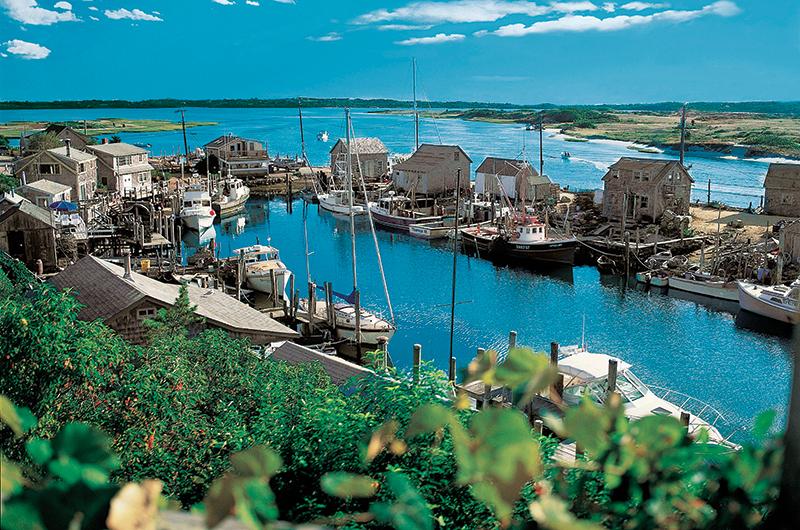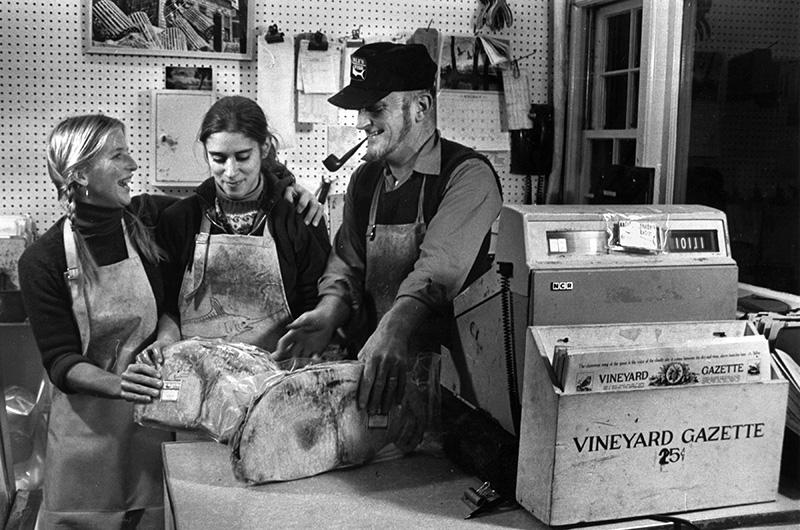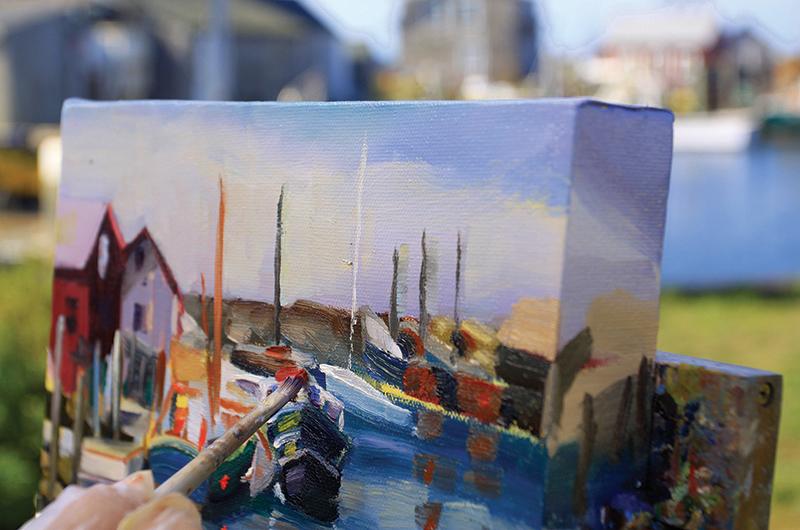- A picturesque inner harbor populated by old-fashioned fishing shacks and colorful boats.
- Peter Simon
Menemsha is in Chilmark, but it doesn’t seem of Chilmark. There is no three-acre zoning in Menemsha, no private beaches with six-figure keys, no massive estates nestled secretly in the wooded hills down rutted dirt paths passable only by Land Rovers. The drama in Menemsha plays out in full view, and is accessible by bus. There are cheap eats, a little beach, public bathrooms, piles of junk lying about, and gas station coffee. Another side of Chilmark is visible over the dunes – huge multi-million-dollar houses perched above the sea. The juxtaposition makes Menemsha so necessary, so needed. Chilmark’s past and present, the Island’s past and present, together in the frame.
Descend the hill into Menemsha, and walk out onto the new dock, rebuilt after the big fire two summers ago. The boats tied up there are nondescript, distinguished only by the length of the waiting list endured to earn these slips. The charter boats rest down by the fish shacks, near the bike ferry purring back and forth between the Aquinnah landing across the channel. The Coast Guard boathouse is gone, like a missing tooth; the Feds will replace it soon. Across the street, the Coast Guard station shines, and the tank-like aluminum patrol vessels sit ready at the dock.
The line at the Galley isn’t too long; try the swordfish pesto sandwich. Quint’s shack was next door once upon a time, and wouldn’t it be cool if it still was? The Home Port Restaurant is quiet, gearing up for the evening rush, and you recall waiting in line for pie at the back door between Monk and one of the Ghostbusters (Egon Spengler, much grayer now).
Sarah and Bob Nixon bought the Home Port in 2008 for the same reason they purchased the Menemsha Inn and Beach Plum Inn: to keep them from closing. “This isn’t an easy way of doing business, that’s for sure,” Sarah says with a chuckle. But as she continues speaking about the restaurant, the fishermen they buy from, the kids they employ, it’s clear the Home Port is exactly what the name implies. “It’s a huge spoke in the economic wheel, a part of the heart and soul of Menemsha.”

Debbie Packer across the street at the Menemsha Market offers similar sentiments about running a business here: “It’s a community....It’s part of something bigger.”
Hang a left at Menemsha Blues, peek in Pandora’s Box, peruse the antiques store. The shops in this place, where so much of the pleasure is free, serve as testimony to both the entrepreneurial spirit and the unquenchable retail urge, the desire to take a piece of this home. And whether behind a cash register or at the helm, everyone here makes a living from the sea.
Reluctant icon Everett Poole lurks in a wispy cloud of pipe smoke in the Chilmark Chandlery, which is open, the sign says, on “windy days, most late afternoons, and other inconvenient times.” “It’s where he wants to be,” says Debbie Packer with affection. “Passing out wisdom, fixing things.”
At the Copperworks, artist/fisherman Scott McDowell is with Annette Cingle, his apprentice and first mate. You can buy one of Scott’s copper wall hangings of a striper, or catch one with him aboard his charter boat, the Lauren C. “Art and fishing,” says Scott of his double life, “how can that possibly not be great?” If you ask if he grew up on the Vineyard, he replies, “Not yet.” Like so many others who’ve been here for decades, Scott came to the Vineyard just for a weekend.
Coffee and T-shirts at Beetlebung. Fried clams at the Bite. The Harbor Crafts Shop. Then around the corner and over the creek to the fish markets. A man in an impossibly dirty ball cap leans into the door of an idling pick-up, talking to a friend. A swimsuited woman holding a balky toddler by the hand makes her way across the street to the solar-powered toilets. Traffic creeps, no one in a particular hurry.

Sitting on a bench behind Menemsha Fish Market, eating a grilled salmon teriyaki sandwich. The warm noon sun is overhead, so there is no shade. A lobsterman in jeans and rubber boots uses a pitchfork to load skate from a plastic bin on the dock into a barrel on his boat. People in shorts and flip-flops walk down the warm planks of the dock, licking soft-serve cones, and ask him about his task.
What would Menemsha be without fishermen at work? It’s a life-and-death business to the fishermen (and the fish), and the sorry state of the fisheries (and fishing regulations) means fishing is tougher now than ever. It’s never been easy.
Menemsha changes, but does not change. And if you think all of this timeless and picturesque seafaring grittiness happens by accident, think again. Read the Chilmark Master Plan, the town’s guide for itself. The goal: “To maintain the visual character of Menemsha as a small fishing village.” And “Assure the priority of commercial fishing boats [over] pleasure craft.”
The fishing boats and the pleasure craft, fishermen and financiers, all eventually pull up to the venerable Menemsha Texaco, where it doesn’t matter who you are in New York or Boston or Philly or DC if you accidentally pump gas into your rod holder. In summer, manager Marshall Carroll spends more than a hundred hours a week at the helm of Menemsha Texaco, slightly less in the winter. Quiet but friendly, Marshall says, “The best part of the job is that we see all walks of life” at the Texaco, which is also part convenience store, part tackle shop, part tourist trap, part ship’s chandlery, and part meeting house. “We do a little bit of everything,” Marshall notes wryly, “and nothing well.” The Menemsha Texaco is actually a Shell station.
Into the parking lot, patrolled by the Chilmark PD. Off-season storms cover the lot with inches of sand that get plowed back to the beach. The Swordfish Harpooner sculpture by Jay Lagemann stands poised in the dune. The sand and water are popular all day, but sunset is the star attraction. You can pick up a boiled lobster to take to the beach for dinner (order ahead), and sit on the cooling sand to watch the sun descend into the sea near Cuttyhunk. The wispy clouds turn fiery orange, and the boats moored offshore pose for snapshots. When the sun hits the horizon, applause, and then the place clears out.

On the jetty, people are fishing – kids with poles bought minutes before at the Texaco next to older men who’ve been at this spot for decades, silhouettes in the fading light. Birds are working in the fast-moving current. This is a serious spot during the fall fishing derby, but not so much now. Even here the fishing is not what it once was. “Nothing is what it used to be,” notes Scott McDowell.
Menemsha changes in the off-season, of course. Like leaves, most of the people blow away, and it’s easier to see the hardscrabble nature of the place, like a trip back in time. The fleet of yachts has been replaced by a flock of eiders seeking shelter behind the jetty. Fishing boats are huddled against the dock; the Constantino L gets a new pilothouse. The sea and sky display cruel hues not often seen in summer.
There are more beautiful places on Martha’s Vineyard than Menemsha. There are hills and meadows and marshes and ocean views more dramatic, there are towns more historic and much more well-kept. There are better beaches and a wider variety of restaurants and shops elsewhere. There are less-crowded places to fish. But sunbathers, swimmers, picnickers, fishermen, and shopkeepers do not love those places with the same ardor. Artists and photographers do not flock to those places in the same profusion. Menemsha offers a blend of man and nature, land and sea, old and new, shabby and chic, wealthy and much-less-so that is inexplicably captivating. Menemsha does a little bit of everything, and everything well.




